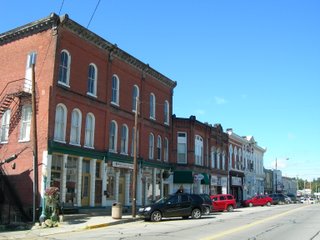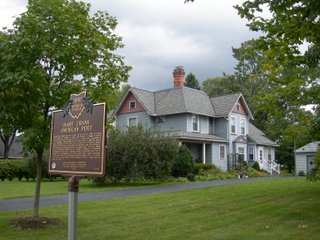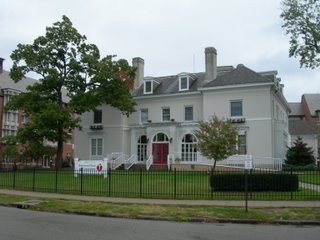Hart of Ohio
GARRETTSVILLE,OH - Ohio is Midwest, and Garrettsville is vintage small town middle border. In the gently rolling hills of the Western Reserve, this village with a mill and a one block main street is the perfect model for the small community which both Crane and Anderson cited for serial suffocation of the artist. This just happened to be Hart Crane’s birthplace. The large  Victorian house of his parents which stands next door to his grandparent’s house was the one home that Crane had where his parents were actually happy. They spent most of Hart's life at war and then apart. I often think of this house when I read Crane’s poem “My Grandmother’s Love Letters’ because you can picture him in the attic with an oil lamp or candle finding the letters and thinking about the “love” that his grandmother had experienced long before she was ever known to him.
Victorian house of his parents which stands next door to his grandparent’s house was the one home that Crane had where his parents were actually happy. They spent most of Hart's life at war and then apart. I often think of this house when I read Crane’s poem “My Grandmother’s Love Letters’ because you can picture him in the attic with an oil lamp or candle finding the letters and thinking about the “love” that his grandmother had experienced long before she was ever known to him.
My Grandmother’s Love Letters
“There are no stars tonight
But those of memory
Yet how much room for memory there is
In the loose girdle of soft rain.

There is even room enough
For the letters of my mother’s mother,
Elizabeth,
That have been pressed so long
Into a corner of the roof
That they are brown and soft,
And liable to melt as snow…”
I went to Hiram College which is only 2 miles from Garrettsville. While a student there, I read Crane's poetry, so whenever I passed this house, I imagined him writing in the attic, even though the real attic or turret room that he was purported to use occured several years later on East 115th St. in Cleveland at his maternal grandmother's house that was razed to make room for what is now The American Heart Association building. This new use seems oddly appropriate. (See picture) But no matter, the romantic vision of the young poet reaching out to the past while intently beginning to shape his craft is a powerful personal
image, mythical in fact and function as a way to construct a vision of the poet at work.
Yet Crane was on to something here that he would long explore- the emotional connection through time that love and parallel experience can provide, and the realization that feeling a passion for beauty and a belief in love is worth the struggle to try to grasp at least a fleeting understanding of both of these. Through this creative act, Crane ultimately and completely immortalizes and universalizes the moment forever even as it crumbles, evaporates and is gone- but not gone . He ends this poem in this way:
“Over the greatness of such space
Steps must be gentle.
It is all hung by an invisible white hair.
It trembles as birch limbs webbing the air.
And I ask myself:
“Are your fingers long enough to play
Old keys that are but echoes:
Is the silence strong enough
To carry back the music to its source
And back to you again
As though to her?”
Yet I would lead my grandmother by the hand
Through much of what she would not understand;
And so I stumble. And the rain continues on the roof
With such a sound of gently pitying laughter. (from White Buildings)
Clarence Crane, Hart’s father, was a businessman and an entrepreneur. He invented the lifesaver candy and worked his entire life ensuring the success of multiple ventures. One of the central conflicts of Hart Crane’s life was his inability to be a worthy heir to his father’s endeavors because, it is undeniable -Hart Crane was at his center a poet, and he paid the ultimate price for this choice, even though, you could argue, he really had no choice at all. Hart had no intesest in being a salesman or working in the factory or even writing advertising copy, although he did all of these things at some point in his life. He was pure and simple – a poet, and from his teen years to his too soon demise at 32, only the muse- in attic, basement, pub or ship – did this Hart ever have a heart for. Van Winkle
 Victorian house of his parents which stands next door to his grandparent’s house was the one home that Crane had where his parents were actually happy. They spent most of Hart's life at war and then apart. I often think of this house when I read Crane’s poem “My Grandmother’s Love Letters’ because you can picture him in the attic with an oil lamp or candle finding the letters and thinking about the “love” that his grandmother had experienced long before she was ever known to him.
Victorian house of his parents which stands next door to his grandparent’s house was the one home that Crane had where his parents were actually happy. They spent most of Hart's life at war and then apart. I often think of this house when I read Crane’s poem “My Grandmother’s Love Letters’ because you can picture him in the attic with an oil lamp or candle finding the letters and thinking about the “love” that his grandmother had experienced long before she was ever known to him. My Grandmother’s Love Letters
“There are no stars tonight
But those of memory
Yet how much room for memory there is
In the loose girdle of soft rain.

There is even room enough
For the letters of my mother’s mother,
Elizabeth,
That have been pressed so long
Into a corner of the roof
That they are brown and soft,
And liable to melt as snow…”
I went to Hiram College which is only 2 miles from Garrettsville. While a student there, I read Crane's poetry, so whenever I passed this house, I imagined him writing in the attic, even though the real attic or turret room that he was purported to use occured several years later on East 115th St. in Cleveland at his maternal grandmother's house that was razed to make room for what is now The American Heart Association building. This new use seems oddly appropriate. (See picture) But no matter, the romantic vision of the young poet reaching out to the past while intently beginning to shape his craft is a powerful personal

image, mythical in fact and function as a way to construct a vision of the poet at work.
Yet Crane was on to something here that he would long explore- the emotional connection through time that love and parallel experience can provide, and the realization that feeling a passion for beauty and a belief in love is worth the struggle to try to grasp at least a fleeting understanding of both of these. Through this creative act, Crane ultimately and completely immortalizes and universalizes the moment forever even as it crumbles, evaporates and is gone- but not gone . He ends this poem in this way:
“Over the greatness of such space
Steps must be gentle.
It is all hung by an invisible white hair.
It trembles as birch limbs webbing the air.
And I ask myself:
“Are your fingers long enough to play
Old keys that are but echoes:
Is the silence strong enough
To carry back the music to its source
And back to you again
As though to her?”
Yet I would lead my grandmother by the hand
Through much of what she would not understand;
And so I stumble. And the rain continues on the roof
With such a sound of gently pitying laughter. (from White Buildings)
Clarence Crane, Hart’s father, was a businessman and an entrepreneur. He invented the lifesaver candy and worked his entire life ensuring the success of multiple ventures. One of the central conflicts of Hart Crane’s life was his inability to be a worthy heir to his father’s endeavors because, it is undeniable -Hart Crane was at his center a poet, and he paid the ultimate price for this choice, even though, you could argue, he really had no choice at all. Hart had no intesest in being a salesman or working in the factory or even writing advertising copy, although he did all of these things at some point in his life. He was pure and simple – a poet, and from his teen years to his too soon demise at 32, only the muse- in attic, basement, pub or ship – did this Hart ever have a heart for. Van Winkle

0 Comments:
Post a Comment
<< Home